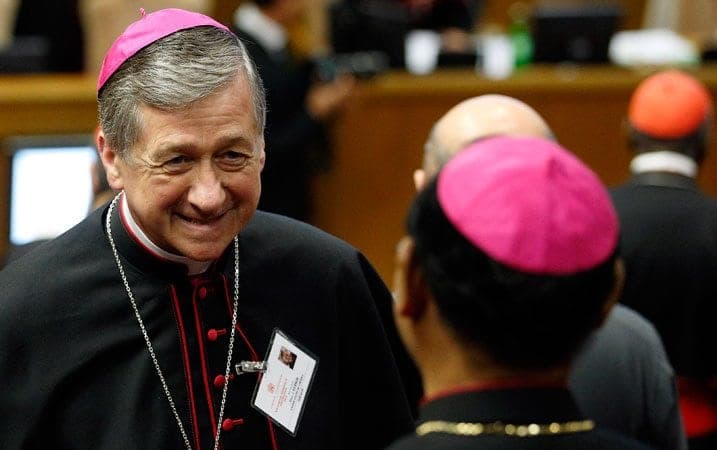CHICAGO — Congress must pass comprehensive immigration reform or the United States risks losing its status as a global humanitarian leader, Archbishop Blase Cupich told a crowd of 300 immigration activists Wednesday.
“The majority of Americans want our Congress to act,” Cupich said, and immigration reform “should not be held hostage to the views of a small but vocal minority.”
Cupich was referring to lawsuits brought against the Obama Administration by several states opposed to the president’s 2014 executive orders meant to shield some immigrants, notably those fleeing violence in Central America, from deportation. A federal court ruled against the executive orders Monday, but the Department of Justice plans to appeal to the Supreme Court.
Cupich’s remarks came during his keynote address to a gathering of immigration activists from throughout the United States hosted by Justice for Immigrants. American bishops launched the initiative a decade ago in order to mobilize parishes to serve as welcome centers for migrants and to pressure lawmakers to pass legislation favored by the Church.
Cupich reiterated the US Conference of Catholic Bishops’ support for the Obama Administration’s immigration efforts, but, he said, “We need a permanent fix by Congress.”
“While our Conference supports President Obama’s executive orders, we consider that step just a band-aid to the much larger problem yet to be solved,” he said, specifically highlighting the DREAM Act, which allows undocumented immigrants brought to the United States as children certain rights to remain in the country.
“If we are unable to meet the humanitarian challenge in our own backyard, we will lose our stature as a humanitarian leader globally,” Cupich said. “Trying to block the executive orders and deport millions of people, including DREAMers brought to the United States as children, and the parents of American citizens, is neither a serious proposal nor an adult way to deal with this issue.”
“If we want opportunity, let us give opportunity,” he said, quoting Pope Francis’ September address to Congress.
Some Congressional Republicans have slammed the president for his immigration action, suggesting Obama exceeded his authority by acting alone on the issue. Cupich rejected that criticism Wednesday.
“If the Congress disagrees with the president’s actions, with the executive order, then Congress should supersede him by passing comprehensive immigration reform,” he said to loud applause.
“Sadly, a broken political system means our elected officials continue in their failure to fix a broken immigration system,” he said, warning that inaction risks alienating an entire generation of young people from the political process.
The Chicago archbishop has emerged as a leader of the center-left wing of the American hierarchy since his appointment one year ago. At a meeting of US bishops in St. Louis earlier this year, he voiced his frustration that USCCB’s proposed priorities through 2020 did not include specific action on immigration.
He said at the time that immigration reform, which has “an enormous impact on family life and marriage,” should play a bigger role in the bishops’ priorities, and he said it was “stunning” that the word “advocacy” was used only in relation to religious freedom.
On Wednesday, he criticized the hypocrisy of relying on immigrant labor without welcoming migrants fully into American life.
“Our country benefits from the toil, the taxes, the purchasing power of a large number of undocumented workers, 8 million in all, and yet at the same time we do not offer them the protection of law,” he said. “We cannot have it both ways.”
“We should appeal to the basic sense of fairness that is very much alive in the human spirit,” he urged activists, thanking them repeatedly for their work.
“Your advocacy is an act of patriotism and contributes to the good of the nation,” he said, slamming “harsh rhetoric” that has dominated recent political debate.
“Let us never be afraid or hesitant to remind the American people that the US is a generous land built by the hands of immigrants,” he said.
He said that while valid economic reasons exist for allowing more immigration, the Church has an important role to play by offering a moral argument.
“When we begin with valuing the lives of these people, a path opens to allow saner voices to prevail,” he said.






